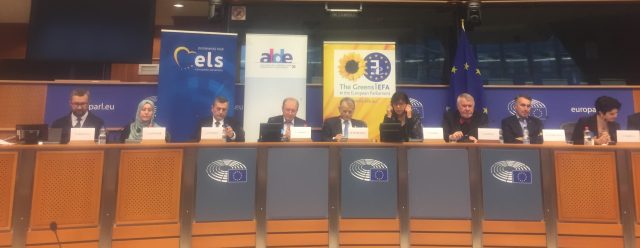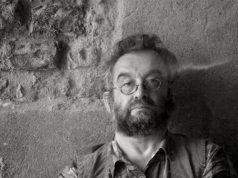On January 31, the European Parliament in Brussels hosted a conference devoted to the issue of “4 Years of Occupation: Ways to support Crimea and Crimean Tatars”.
The speakers relayed the extreme difficulty of the situation faced by the Crimean Tatar people in the 4th year of the occupation of their ancestral homeland, the Crimean peninsula. The conference was organized by Green Party parliamentarian Rebecca Harms, a steadfast ally of the Ukrainian and Crimean Tatar causes within the European Parliament, and was co-hosted by Lithuanian MP Petras Auštrevičius and the Czech parliamentarian and former journalist Jaromír Štětina.
The conference focused on technical issues related to the de-occupation of Crimea in Brussels, and featured the undisputed leader of the Crimean Tatar people, Mustafa Dzhemilev. Two deputy Chairmen of the Mejlis, the elected deliberative assembly of the Crimean Tatar people, Akhtem Chiygoz and Ilmi Umerov — who were freed from Russian captivity in October — and other political activists also took part in the discussions. The Crimea SOS organization was represented by its founder, Tamila Tasheva, whose own family had been exiled by Stalin in 1944 to Uzbekistan and only later returned to Crimea.
The half dozen Crimean leaders, politicians and lawyers spoke of the importance of documenting and archiving the actions of the Russian authorities. Indeed, the repression faced by the Crimean Tatars is severe. Some kidnappings and coercive searches in which the Russian authorities on the peninsula have engaged have even ended with high-profile deaths — such as when Vedzhie Kashka, a renowned, eighty-three-year-old activist died of a heart attack in the midst of a security service raid on her home.
The systematic repression faced by pro-Ukrainian residents of Crimea and the Crimean Tatar community include the systematic kidnapping and torture of civic activists, enforced passportization (without which life in Crimea and access to government services is functionally impossible), a ban on freedom of expression and a prolonged process of economic and ecological degradation in the Crimean peninsula. The Crimean Tatars in particular are being targeted by Russian security forces, and have suffered more than 95 percent of the 1000 searches that have taken place in the last four years.
At the conference in Brussels, the Crimean Tatars reiterated the illegitimacy of the referendum that preceded Russia’s annexation of Ukrainian territory in March 2014. Of the 280,000 Crimean Tatars who had the right to participate in thе internationally unrecognized referendum on Crimean independence, only 900 (less than 1% of the eligible population) showed up to vote, according to the internal numbers available to the community leadership. (Only 30 or 35 percent of the Ukrainian and Russian population of the territory took part in the vote.)
Czech MEP Štětina underlined that this year marked the 50th anniversary of the Soviet occupation of Czechoslovakia. Ironically enough, much of the dialogue took place in Russian, with Štětina switching to Russian from English at the end of the panel to point out that Dzhemilev spoke out against the Soviet occupation of Prague and that he was now returning the favor. With pro-Kremlin Czech President Miloš Zeman recently re-elected to office with a comfortable margin, Štětina publicly apologized to Dzhemilev for Zeman’s statements in support of legitimizing the Russian annexation of Crimea.
Dzhemilev spoke about the effect of Russian propaganda and compared the new regime unfavorably to the Soviets.
“In Soviet times, there was a procedure at least to the killings; with the ‘Troikas’ (Ed: military legal tribunals of three that were empowered to prescribe summary military justice) ordering shootings, but nothing like these disappearances and killings taking place now,” he said.
Chiygoz stated that it was the second time the Russians had exiled the Crimean people from their own homeland and that the Russian authorities routinely refused to provide responses to official requests from Crimean Tatar lawyers.
The conference participants also addressed the role of Turkey — a country with its own complex human rights situation — in Tatar affairs. The Turkish government has been intimately involved in lobbying on behalf of the Crimean Tatars with Moscow. However, in detailing his post-occupation meeting with President Recep Tayyip Erdogan, Dzhemilev expressed his disappointment that the Turks did not blockade the Dardanelles or the Bosporus for transit by Russian ships and did not join the international sanctions against Russia.
“To be honest, we expected more sharp condemnation from the Turks, who did not do more because of economic reasons,” he explained to the audience.
The Turkish government has actively engaged with the Russians to push for hostage exchanges — Erdogan even lobbied Russian President Vladimir Putin to secure the release of former political prisoners Umerov and Chiygoz. However, Harms stressed that there are still many cases of extralegal detention in Crimea that must to be addressed.
The Russian authorities have engaged in the systematic purging of teachers, university instructors and doctors who have spoken out publicly against the occupation. The speakers underlined that the majority of the judicial processes being levied against Crimean Tatars are illegal according to the norms of the Russian Federation itself, as well as the international requirements of human rights law. Perhaps as many as 200 people are being held by under administrative detention, they noted. The occupying authorities’ repression and their total ban on traditional Tatar media in Crimea have necessitated the emergence of “civic” journalism to provide information about events on the peninsula.
The conference participants’ practical recommendations for accountability included an exhortation to work closely with the exiled office of the Crimean Prosecutor, which is now based in Kyiv, and to maintain sanctions pressure on the Russian government. All the speakers were in agreement on the importance of maintaining a united front on sanctions in order to preserve the rules-based international order set up in the wake of the Second World War.
Dozens of cases are ongoing against Crimean Tatars in Russian courts, in the the same fashion that previous generations of political prisoners have attracted international attention, contemporary Tatars should also enjoy that level of support, the conference participants stated. They also encouraged national parliaments to create Magnitsky-style legislation, as well as to provide moral and political support to the Crimean Tatar activists who remain in Crimea and those who have crossed the newly imposed border into the Ukrainian mainland.
Several speakers, including the MEPs present, called for conditionality to be imposed on the upcoming World Cup tournament in Russia, although several of the Crimean Tatar speakers voiced understanding of how difficult it would be to call for a total international boycott of the football tournament.
The conference concluded with a screening of ‘Mustafa,’ a meditative mixture of documentary and fictionalized biopic depicting Dzhemilev`s life, in the iconic Brussels art house Cinéma Vendôme. The 2016 film, produced by CrimeaSOS’s Tasheva through piecemeal donations made by the Crimean Tatar diaspora and activists, caused a minor international incident last year after the Russian government banned its screening at a Russian film festival.
The film juxtaposes historical archival material and long pans of the lush Crimean countryside with acted scenes dramatizing Dzhemilev’s titanic struggle against the Soviet regime, including scenes from his 303-day-long hunger strike in the gulag and interrogations by Soviet psychiatrists.
The film frames the stoic Dzhemilev as an elderly Soviet pensioner who had been called out of his hard-earned retirement when his Moses-like life’s work of leading his people back to their ancestral homeland was cruelly snatched away in his old age.
After the screening, Dzhemilev spoke movingly about his life`s struggle and the plight of the Tatar people to a film theater full of Belgian youth, as well as members of the Ukrainian diaspora living in Western Europe. It was the 1432nd day of the occupation and each new day involved the harassment and humiliation against the dignity of the indigenous people of the Crimean peninsula.
An impassioned Dzhemilev pleaded with the Belgian youth to not accept Russian state arguments for the continued occupation of Crimea: “If you accept those arguments and give into appeasement now, soon enough, you may see Russian tanks in the streets of Brussels!”




































